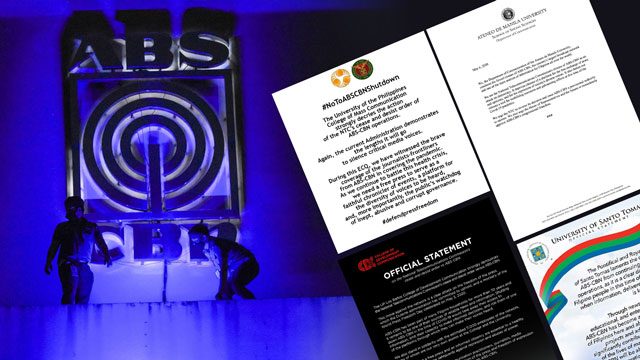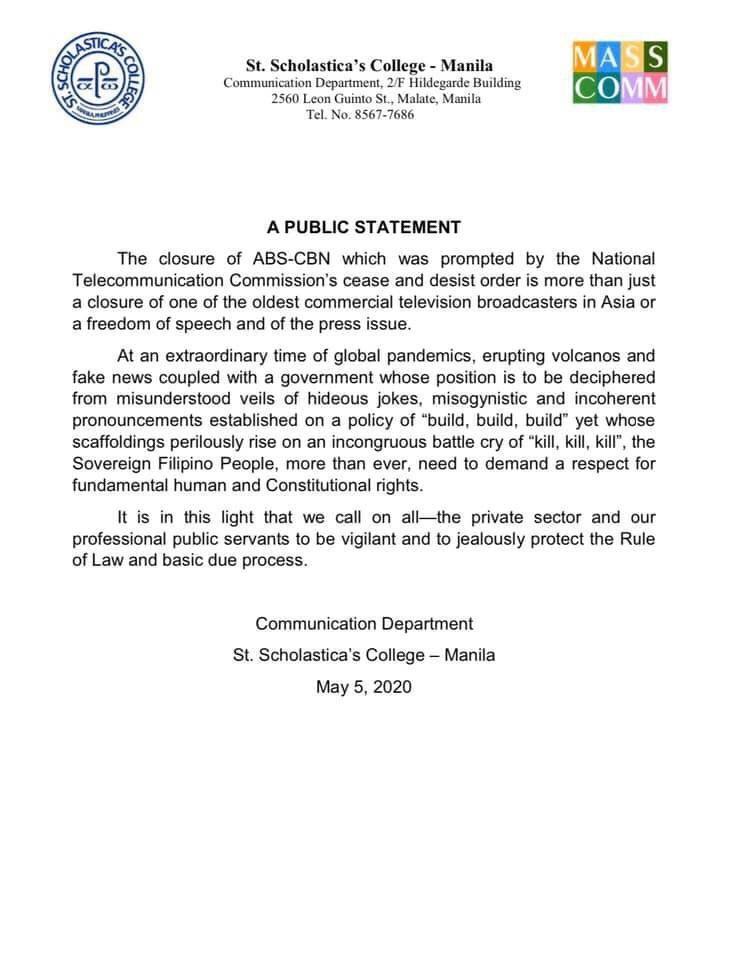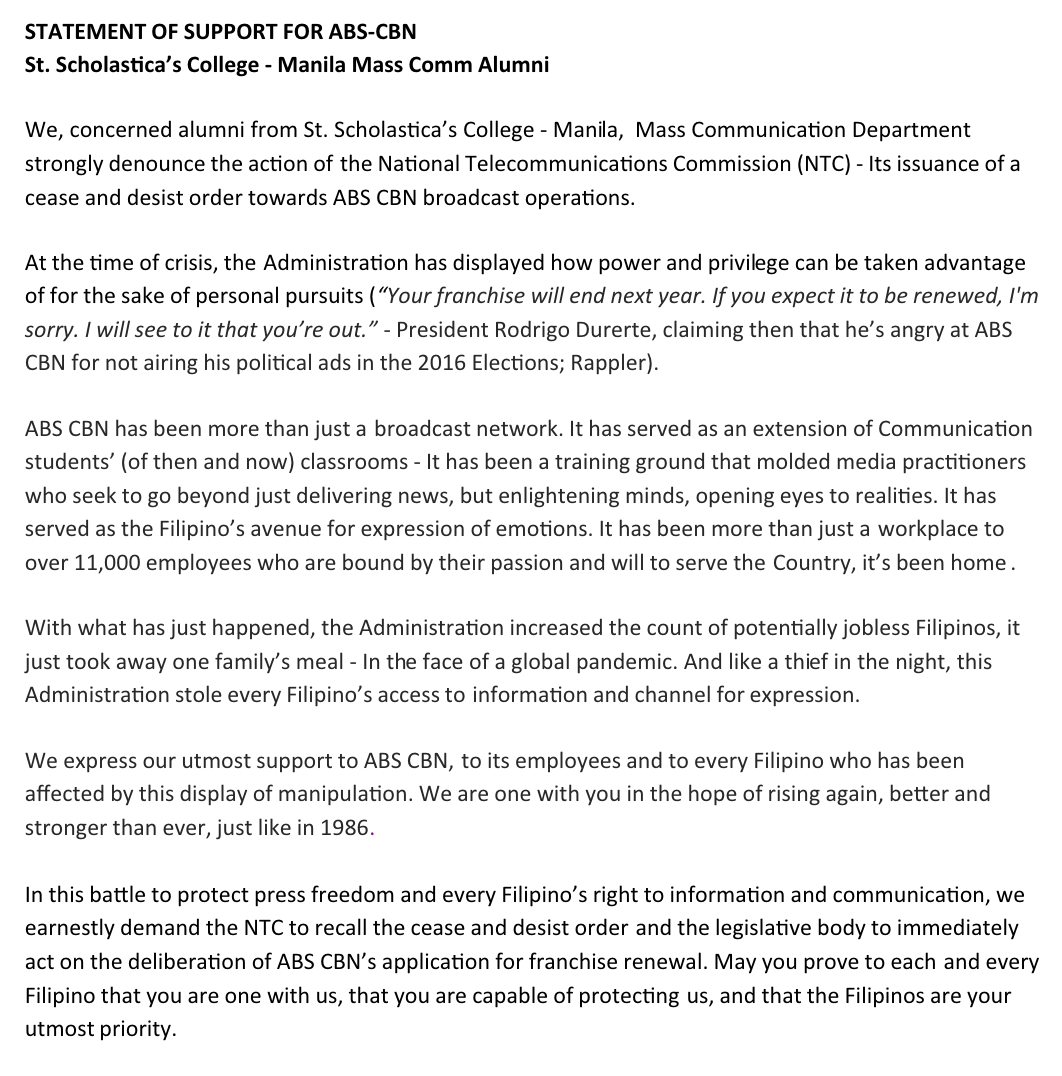SUMMARY
This is AI generated summarization, which may have errors. For context, always refer to the full article.


Editor’s note: The earlier version of this article included an embed of the position paper attributed to St. Scholastica’s College – Manila Mass Communication Department. Since, it turned out, the group used the letterhead of the college without authority, we removed and replaced it with a screenshot of the statement from the alumni.
MANILA, Philippines – Academic institutions are taking a stand against the National Telecommunications Commission’s (NTC) move to halt all broadcasting operations of media giant ABS-CBN at a time where Filipinos urgently need information during the coronavirus pandemic.
This is the latest in the company’s years-long tussle with the government under President Rodrigo Duterte. (TIMELINE: Duterte against ABS-CBN’s franchise renewal)
Earlier this year, Solicitor General Jose Calida filed a quo warranto petition against ABS-CBN and accused them of foreign ownership. Congress also failed to act on ABS-CBN’s franchise renewal, as the company’s franchise was first granted in 1995, which allowed them to operate for 25 years.
The network signed off at 7:52 pm on Tuesday, May 5.
The last time ABS-CBN was ordered closed was in 1972, during Ferdinand Marcos’ Martial Law. ABS-CBN would only later reopen in 1986 after the EDSA People Power Revolution toppled the dictator, bringing widow Corazon Aquino into power.
Many schools were quick to slam the NTC’s cease and desist order as well as the government’s overall attack on press freedom and democracy.
De La Salle University lit up St. La Salle Hall in ABS-CBN’s colors a few hours after the network went off-air, to show its solidarity with the network’s employees and the millions of Filipinos who depended on the company’s broadcasts and programs.
The University of the Philippines (UP) Diliman College of Mass Communication slammed the administration for “the lengths it will go to silence critical media voices.”
“As we continue to battle this health crisis, we need a free press to serve as a faithful chronicler of events, a platform for the diversity of voices to be heard, and, more importantly, the public’s watchdog of inept, abusive and corrupt governance,” the Department’s statement read.
The College of Development Communication from UP Los Baños stated ABS-CBN’s shutdown during the coronavirus pandemic would “take away [Filipinos’] access to information, limit their capacity to make informed decisions, and rob them of one of the platforms through which they can be heard.”
“We believe that a free press and an informed citizenry are essential to a healthy democracy – these are safeguards against repression and abuses of power,” the statement read.
Ateneo de Manila University (ADMU) President Jose Ramon Villarin stressed the network’s closure “deprives the Filipino people of a vital source of information, entertainment, and public service.”
“ABS-CBN’s closure extinguishes the brightest light in our information firmament and leaves the smaller ones in darkness and peril,” Villarin wrote.
ADMU’s Communication Department shared Villarin’s sentiments, calling the closure an “attack on democracy.”
“It deprives citizens of a platform for the free exchange of news and opinions, and for the expression of society’s diverse voices. It also denies our citizens a tool for mobilizing resources and galvanizing efforts at this time of the COVID-19 pandemic,” the Communication Department wrote in a statement.
The University of Santo Tomas (UST) highlighted how ABS-CBN significantly improved the lives of many Filipinos, both in and out of the country.
“It is a clear disservice to the Filipino people in this time of the pandemic, when information, delivered fast and wide, is key to saving lives,” UST wrote.
Journalism educators from UST also released their own statement, stating Duterte has “declared war on the free press” and cited ABS-CBN’s closure as “his Pearl Harbor attack.”
“There is no more denying that the Duterte regime will stop at nothing – even amid a national emergency and a crippling lockdown – to crush dissent and stifle a free and independent media. Shutting down media is the work of dictators,” the statement read.
Statement of journalism educators from UST on the closure of ABS-CBN pic.twitter.com/Uc9zdOGciu
— Felipe Salvosa II⁷ (@felipesalvosa) May 5, 2020
St. Scholastica’s College – Manila said the network’s shutdown is “more than just a closure of one of the oldest commercial television broadcasters…or a freedom of speech and of the press issue.”
“The Sovereign Filipino People, more than ever, need to demand a respect for fundamental human and Constitutional rights,” they wrote.

Alumni of St. Scholastica’s College – Manila’s Mass Communication Department also dubbed ABS-CBN “more than just a broadcast network,” as it served as an “extension of Communication students’ classrooms,” and “the Filipino’s avenue for expression.”
“Like a thief in the night, this Administration stole every Filipino’s access to information and channel for expression,” alumni wrote.

The St. Theresa’s College Quezon City Alumnae Association echoed this sentiment. In a video statement, the group expressed outrage over the move to silence the network.
“As Filipinos, it is our duty to defend press freedom when it is threatened. We lost it before to a dictator. #NeverAgain should we let this happen.”
It also urged Congress to act swiftly on ABS-CBN’s franchise renewal, and hoped that the network would get fair treatment in its legal battle.
– Rappler.com
Add a comment
How does this make you feel?
There are no comments yet. Add your comment to start the conversation.